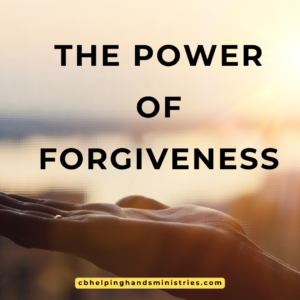The Power of Forgiveness

In a world where conflicts are inevitable, and misunderstandings are commonplace, the act of forgiveness emerges as one of the most profound and powerful tools for healing and growth. Forgiveness is often viewed as a gift we give to others, but in reality, it is an invaluable gift we give to ourselves. It alleviates burdens, cultivates resilience, and fosters emotional well-being.
At its core, forgiveness is the conscious, deliberate decision to release feelings of resentment or vengeance toward a person or group who has harmed you, regardless of whether they deserve your forgiveness. It’s essential to clarify that forgiveness does not mean condoning harmful actions or relinquishing accountability. Instead, it is a choice to let go of negative emotions that can weigh us down.
Carrying anger, hurt, or resentment can be incredibly taxing on our mental and physical health. Numerous studies have shown that holding onto grudges can lead to heightened anxiety, depression, and even physical ailments such as hypertension and weakened immune responses. When we refuse to forgive, we often end up hurting ourselves more than the person who wronged us.
1. A Path to Inner Peace: Forgiveness allows us to reclaim our peace of mind. When we release the grip of negativity, we open ourselves up to positive emotions and experiences that can enhance our quality of life.
2. Improved Relationships: Choosing to forgive can strengthen our existing relationships and pave the way for new, healthier connections. It fosters empathy and understanding, teaching us the importance of compassion in our interactions with others.
3. Personal Growth: The process of forgiveness often leads to introspection and self-discovery. It encourages us to confront our feelings and recognize patterns in our behavior that may need addressing, promoting personal growth and resilience.
Forgiveness is not always easy; it often requires time, effort, and a willingness to change our perspectives. Below are some practical steps that may assist in the journey towards forgiveness:
1. Acknowledge Your Feelings: Give yourself permission to feel hurt, angry, or betrayed. Recognizing these emotions is the first step towards healing.
2. Reflect on the Situation: Try to see the situation from different angles. Understanding the context in which the hurt occurred can provide insight and reduce some of the sting.
3. Shift Focus from the Offender: Instead of fixating on the person who hurt you, redirect your energy towards your healing. Engage in activities that bring you joy and fulfillment.
4. Communicate (if appropriate): Sometimes, expressing your feelings directly to the person who hurt you can be liberating. However, this step is only necessary if you feel safe and comfortable doing so.
5. Practice Empathy: Consider the offender’s perspective and recognize that everyone is capable of making mistakes. This can help humanize them and make it easier to let go.
6. Seek Professional Help: If forgiveness feels overwhelming, consider talking to a therapist. Professional guidance can provide tools and coping strategies to help navigate these complex emotions.
Embracing forgiveness can lead to a profound shift in our outlook on life. It empowers us to free ourselves from the chains of bitterness and resentment, transforming a negative experience into an opportunity for growth. When we forgive, we recognize our strength and resilience, paving the way toward a brighter, more fulfilling future.
The power of forgiveness lies not only in mending relationships but also in nurturing our own emotional health. It is a courageous act that can lead to greater happiness, improved mental well-being, and, ultimately, a more harmonious life. Embrace the journey of forgiveness; the freedom and healing that await you are well worth the effort.
Apostle Shelia
SBI Ministries
C.B. Helping Hands Ministries
Follow Us
Stay up-to-date with our latest articles and insights by following us on social media:
https://www.facebook.com/CBHelpingHands
This website is a treasure trove of valuable information, and we’re committed to keeping it free for everyone. If our content has made a positive impact on your life, consider supporting us with a donation to help us continue sharing knowledge freely.
Leave a Reply